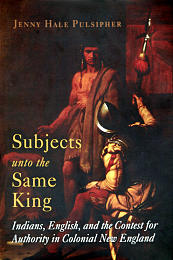|

Pilgrims and savages? No!
BYU author's book an eye-opener
By Tad Walch
Deseret Morning News
PROVO — The three-day Thanksgiving celebration in 1621 is proof the Indians and the Pilgrims were friends, but a groundbreaking
new book by a Brigham Young University professor challenges stereotypes about the Native Americans at that first Thanksgiving
and beyond.
Jenny Hale Pulsipher's research demonstrates that the Wampanoag Indians were politically savvy. First they skillfully used
their alliance with the Pilgrims to protect them from a stronger rival tribe. Then they manipulated English law and their
treaty with the Pilgrims to maintain their autonomy as power began to shift throughout New England.
Other American Indian groups were equally astute, the key to a largely peaceful coexistence with English settlers for more
than 50 years. One Indian even traveled to England, won an audience before the king and persuaded him to write a letter in
his behalf to the Massachusetts Bay Colony.
"This book is an attempt to get past the simplification of early New England history — the Indians versus the
English — and show that it was a much more complex interaction," Pulsipher said of "Subjects Unto the Same King: Indians,
English, and the Contest for Authority in Colonial New England."
"The Indians took advantage of the colonists' problems with England," she said. "Massachusetts was in the doghouse with
the crown, and the Indians realize if they get in good with the crown, they will be able to withstand the Massachusetts Bay
Colony's growing influence in the region."
The Pilgrims landed in an area occupied by the Wampanoags, who gratefully embraced a new ally bearing guns. Epidemics
sparked by earlier European visitors had decimated their numbers while their rivals to the south, the Narragansetts, remained
strong and healthy — and threatening. Equally concerned about the Narragansetts, the starving Pilgrims entered into
a treaty known as the "League of Peace."
Wampanoag leader Massasoit also consented to become a subject of King James, which the Indians saw as making them equal
with the colonists.
"Any time they had a conflict with the English," Pulsipher said, "the Indians said, 'We're subjects of the king like
you; we don't owe you anything. Talk to the king.' It was a very savvy use of the political structure."
An Indian named John Wompas, his claims of land ownership rejected by colonial courts, took his case directly to the
king's court. Wompas learned firsthand how worried the leaders of the Massachusetts Bay Colony were that the king would revoke
their charter because Wompas saw the colonists pleading with him on their knees.
Pulsipher found the story revealing.
"People hearing about this audacious person, who goes all the way to the king and gets his letter, are just amazed that
the Indians would go to that extent, that they understood the lines of authority perfectly well and that they knew how to
challenge local authority."
The peace ended in 1675 with King Philip's War, which prompted the king to revoke the charter and cost both the colonists
and the Indians much of their power. Pulsipher provides a new telling of the war and shows how the two sides maintained their
peace by navigating each other's political systems.
She researched more than 2,500 manuscript documents, some previously unknown, in eight archives and dozens of libraries
in New England and examined several thousand published letters, sermons, court records, narrative accounts and journals. "Subjects
Unto the Same King" has been nominated for six national awards.
"I think it's a great book," said Peter Mancall, a University of Southern California historian who read the work twice
to evaluate it for the University of Pennsylvania Press. "I think it really complicates and makes much more real the early
American experience. She really takes Native Americans seriously, and she realizes that you can use the historical record,
mostly written by colonists, to really understand underlying truths about the colonial experience."
Mancall said the Thanksgiving season perpetuates "silly, very superficial stereotypes," while Pulsipher's book makes
it clear the native peoples were not naive or simpletons.
"It's about the process of how these two peoples inhabited this one place and native agency," he said. "The Indians
controlled much more of their destiny than we thought initially."
Despite the many myths surrounding the first Thanksgiving, Pulsipher said the Indians and Pilgrims indeed were friendly,
with the Wampanoags frequently camping across the river from their allies or even living with them in the village. The holiday
certainly has become a meaningful symbol for Americans.
"I like it," Pulsipher said. "We come from these different backgrounds, cultures and traditions, but we have this idea
we can come together as Americans. Thanksgiving is an opportunity for us to be hopeful about cooperation in an increasingly
divided and diverse world."
|


